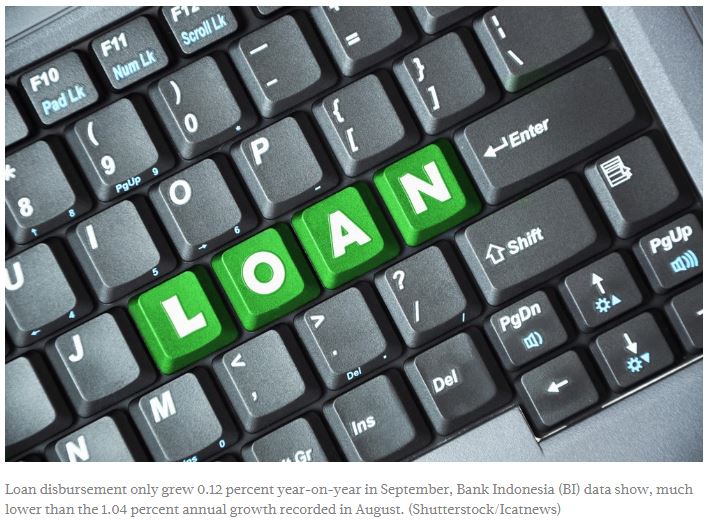Indonesia – Weak loan growth, rising savings signal further GDP contraction: Economists
Slowing loan growth and rising savings point to a continued plunge in economic activity in the third quarter of this year as consumer spending weakens, economists say.
Loan disbursement only grew by 0.12 percent year-on-year (yoy) in September, Bank Indonesia (BI) data show. That figure is much lower than 1.04 percent annual growth recorded in August. Last year, Indonesia’s banking industry recorded loan growth of around 6 percent.
While loan issuance was almost stagnant, savings increased strongly last month. Banks’ third-party funds expanded by 12.88 percent yoy in September across the entire industry, higher than August’s figure of 11.64 yoy.
“Most consumers are still concerned about the uncertainties surrounding the COVID-19 pandemic, so those in the middle and upper-middle class segment chose to park their funds in the banks,” Bank Permata economist Josua Pardede told The Jakarta Post on Wednesday.
He went on to say that the cooling loan growth and rising savings in September were partly influenced by the reimposing of large-scale social restrictions (PSBB) by the Jakarta administration.
Governor Anies Baswedan announced in the month that the city would tighten the rules again because of the rise in COVID-19 cases. The restrictions lasted for four weeks, from Sept. 14 to Oct. 10, before Anies loosened the restrictions again on Monday.
Indonesia’s economy contracted 5.32 percent yoy in the second quarter and is expected to shrink further in the third quarter, following plunging household spending, which accounts for more than half of the country’s gross domestic product (GDP), and business investment.
The BI survey reveals that consumer confidence weakened to an index reading of 83.4 in September, down from 86.9 a month earlier. A figure below 100 reflects pessimism.
The survey finds that consumers had lower expectations about the economic prospects over the next six months, which is in line with projections that business expansion, the job market and income growth will take a long time to recover to pre-pandemic levels.
The increased savings did not only come from the middle and upper-middle class, Josua said, noting that many corporations were also opting to put their money in the bank.
Indonesian Deposit Insurance Corporation (LPS) data show that savings in bank accounts holding Rp 5 billion (US$338,345) or more rose 15.2 percent yoy to reach to Rp 3.19 quadrillion in August, as quoted by Kontan. These accounts number around 107,000.
“These accounts are not only owned by individuals from the upper-middle segment, but also by corporations that decide to delay their expansion plans, which causes their idle funds to increase,” Josua said.
Publicly listed oil and gas company PT Medco Energi Internasional, for instance, has announced a reduction in its capital expenditure (capex) by 30 percent to $240 million this year in response to weakened global demand and lower oil prices.
State-owned airport operator PT Angkasa Pura II also reduced its capex to Rp 1.4 trillion this year, 20 percent less than the initially earmarked Rp 7.8 trillion, due to a sharp drop in aircraft and passenger traffic amid the pandemic. Given the weak investment and household spending, Josua said he expected the country’s gross domestic product (GDP) would continue to contract in the third quarter of this year, but at a slower rate than in the previous quarter.
“Although demand and investment have slowly started to recover due to loosened restrictions, it has yet to fully get back to last year’s level,” he said, projecting the GDP to contract by around 3 percent in the third quarter.
Meanwhile, BNI Sekuritas economist Damhuri Nasution expects the country’s economy to contract by 3.27 percent yoy in the third quarter, citing lower investment and consumption as the main reasons.
Damhuri was of the view that the key to economic recovery laid on the government’s effort to control the spread of the coronavirus.
“The government must be firm in implementing the health protocols among the public to slow the infection rate and restore optimism in the economy,” he said.
“Once optimism has improved, consumers will want to spend their money again and investment will also rise as producers respond to the increasing demand,” he added.
Source: https://www.thejakartapost.com/news/2020/10/15/weak-loan-growth-rising-savings-signal-further-gdp-contraction-economists.html


 Thailand
Thailand




